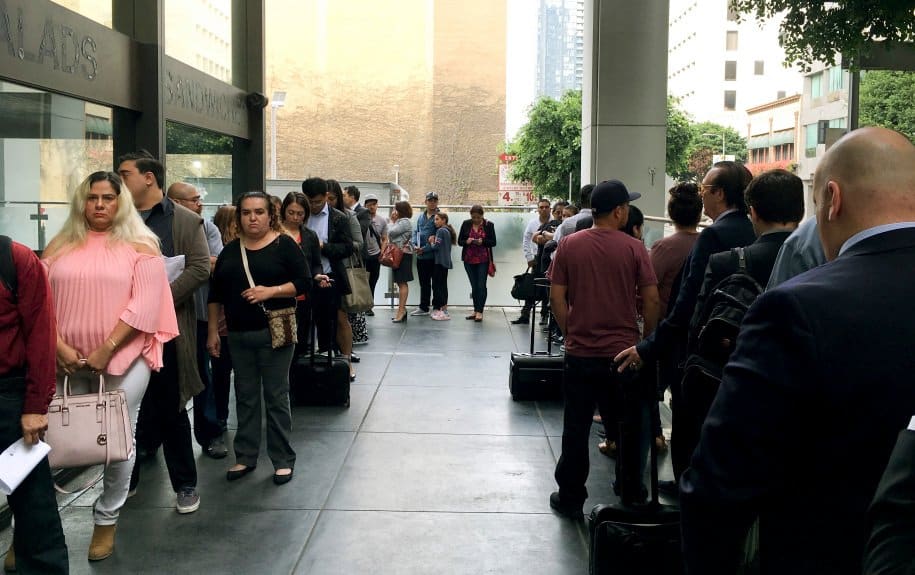“They can’t just squeeze them in.”
Thanks to the government shutdown, Los Angeles immigration attorney Douglas Jalaie knew it was unlikely that his client, a refugee applicant from Afghanistan, would get his long-promised day in court Thursday.
Still, the two were prepared. The man showed up early at the downtown Los Angeles Immigration Court, and soon began trading text messages with Jalaie, who works in an office across the street.
“At first, I told him to wait just in case they opened the elevators at 8:30 a.m.,” Jalaie said.
But immigration courts across the country continued to be closed for all cases except for those involving immigrants in detention. The government shutdown, in addition to contributing to a growing sense of uncertainty and stress, is adding to a huge backlog in a court system where people already wait years to have their cases decided, immigration experts said this week.
If President Trump declares a state of emergency, as he has indicated he wants to do, it’s unclear what would happen next in immigration courts.
“There’s been a lot of debate on the scope and authority of the president in declaring a state of emergency. This would be unprecedented, so I don’t know,” said A. Ashley Tabaddor, president of the National Association of Immigration Judges.
“We are not aware of any agency-wide action plan to deal with the consequences of such a large shutdown and what it would take to be ready and get up to speed,” she said Thursday.
Meanwhile, thousands of cases are being canceled daily, said Tabaddor, an immigration judge in Los Angeles who spoke in her role with the judges’ union.
“Once the shutdown is over, it’s going to be even more difficult to try to figure out those cases because the judges already are often booked out morning and afternoon, often double-booked and triple-booked for years in advance.”
“The cases will likely have to go back to the end of the line,” she added. “So that’s another two or three years of wait, or the judges will have to bump other cases to accommodate these.
“Either way, it’s a lose-lose situation.”
As L.A. immigration attorney Ally Bolour explained it: “They can’t just squeeze them in.”
More than 800,000 immigration court cases across the nation are pending, with the biggest backlog – nearly 147,000 cases – in California. The local numbers include more than 76,000 cases pending in Los Angeles, which, after New York, is the second biggest backlog of any city in the country, according to the Transactional Records Access Clearinghouse at Syracuse University. San Francisco has the third largest caseload in the nation with more than 60,000 cases as of November; TRAC reported.
For immigrants going through the court process, the shutdown-driven delays present just one new layer of stress to an already life-altering situation.
“Being in removal proceedings is never a good thing,” said Bolour, who serves on the board of the American Immigration Lawyers Association.
“You’re talking about families, about people who live day to day because they don’t have extra resources. They have kids to feed and take to school… Not knowing what’s going to happen, that’s beyond traumatic.”
Immigration attorneys end up acting as counselors and mental health therapists, he said.
“Every day, half of my time is talking to people and trying to calm them down.”
Sometimes, having a court case delayed can help someone’s case. But, generally, immigration attorneys say their clients don’t see much benefit from the extra time – particularly under an administration that routinely changes immigration policies, said Orange County immigration attorney Annaluisa Padilla, the immediate past president of the American Immigration Lawyers Association.
“We want cases to be heard now. If we wait longer, then we have to wonder what is the administration going to do to change policy and make it more difficult,” said Padilla, who is based in La Habra.
Last year, for example, then-Attorney General Jeff Sessions said domestic violence or threats of gang violence would no longer be valid reasons to qualify for asylum, changing long-standing asylum law. Sessions also ruled that immigration judges no longer could use their own discretion to end or dismiss cases. And – in a move the judges’ union criticized – Sessions imposed a quota of 700 cases per judge per year.
Though the number of immigration court judges has increased significantly in the last two years, from about 300 to 400, the number of cases continues to go up. During the 2013 shutdown, for example, the backlog was nearly 346,000 cases. By December 2017, the number had grown to almost 668,800. And the cases continue to add up, leading to long delays.
For people in the system the limbo can feel endless.
Jalaie said his client, for example, first applied for refugee status more than four years ago. The Afghanistan man is telling the court that he is fleeing the Taliban, who killed his father, a journalist.
Thursday, Jan. 10, could have marked his final hearing. But his case was delayed, his lawyer said. It now could be years before he learns his fate.


